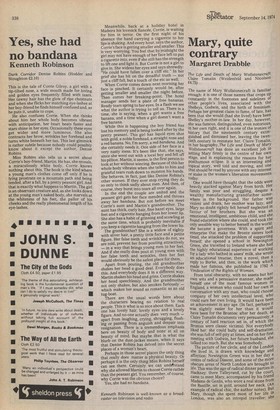Yes, she had no bandana
Kenneth Robinson
Dark Corridor Denise Robins (Hodder and Stoughton £2.10) This is the tale of Corrie Gilroy, a girl with a tip-tilted nose, a wide mouth made for loving and golden eyes frequently filled with tears. Her tawny hair has the glow of ripe chestnuts and when she flicks her matching eye-lashes at her boy-friend he finds himself confused and, as he puts it, unable to cope.
He also confuses Corrie. When she thinks about him her whole body becomes vibrant with anticipation, her heart beats faster and stars shine in her eyes. Occasionally these eyes get wider and more luminous. She also contracts her brow, wrinkles her forehead and turns white beneath her tan. This last gimmick is rather subtle because nobody could possibly know about it except the author, Denise Robins.
Miss Robins also tells us a secret about Corrie's boy-friend, Martin. He has, she reveals, a miraculously white body. Corrie knows nothing about this. The book is the kind where a young man's clothes come off only if he is lying prostrate on a mountain path and being tended, after a fall, by a pretty peasant girl. And that is exactly what happens to Martin. The girl is an observant creature and, as she looks down at the young man's naked body, she marvels at the whiteness of his feet, the pallor of his cheeks and the really phenomenal length of his eye-lashes. Meanwhile, back at a holiday hotel in Madeira his lovesick fiancee, Corrie, is waiting for him in terror. On the first night of his absence the hand carrying a cigarette to her lips is shaking. And every hour, says the author, Corrie's face is getting smaller and smaller. This is very worrying. You feel that by midnight the girl may not have enough of her face left to put a cigarette into, even if she still has the strength to lift one and light it. But Corrie is not a girl to give in. She widens her eyes and says shrewdly: "He could have fallen over a cliff etc." In her grief she has hit on the dreadful truth — not just a cliff fall, but a touch of the etc as well. When Corrie comes down next morning her face is pinched. It certainly would be, after getting smaller and smaller the night before. Then comes her breaking-point. The hotel manager sends her a plate of free bananas. Ready tears spring to her eyes. In a flash we see what the author is trying to tell us. There is a time, she is saying, when a girl wants a free banana, and a time when a girl doesn't want a free banana.
While this is happening the boy friend has lost his memory and is being looked after by the pretty peasant. This girl has liquid eyes shot with gold, a noble forehead, a straight nose and a red banana. No, I'm sorry, a red bandana. And she certainly needs it. One side of her face is a very nasty mess. It's been like that, she says, since she went out with a local boy and fell off his pillion. Martin, it seems, is the first person to look at her without wincing. Because of this her whole body vibrates when she talks to him and grateful tears rush down to moisten his hands. She behaves, in fact, just like Denise Robins's other women. If they ever stop crying they do so only to think sadly about men. And then, of course, they burst into tears all over again.
In the end the couple are united and the peasant girl gets her face mended and throws away her bandana. But not before we meet. Corrie's aunt and Martin's grandmother. The aunt has thick, curly hair, fine hazel eyes, large feet and a cigarette hanging from her lower lip. She also has a habit of grinning and scowling at the same time, which is probably inevitable if you keep a cigarette hanging from the lower lip.
The grandmother? She is a widow of eighty with silver hair, a pretty little face and a petite figure. Her false teeth and wrinkles do not, we are told, prevent her from pouting attractively — in a way that brings young men to her feet. And if she really does pout at young men with her false teeth and wrinkles, then her feet would obviously be the safest place for them. Apart from pouting, the old grandmother shakes her head a good deal. Everybody does this. And everybody does it in a different way. Martin shakes his head and grins. Corrie shakes her head speechlessly. And the grandmother not only shakes, but also smokes furiously — which makes her sound as romantic as an old tug-boat. There are the usual words here about the characters bearing no relation to real people. This is what is so nice about them. Each one has lovely hair, lovely eyes and a lovely
figure. And no-one actually does very much — apart from laughing, crying, shrugging, flush
ing or passing from anguish and despair into resignation. There is a tremendous emphasis here on beauty of body and none at all on beauty of mind. But maybe that is what the blurb on the dust-jacket means, when it says that Denise Robins has delved into the secret places of a woman's heart.
Perhaps in those secret places the only thing that really does matter is physical beauty. Or
perhaps it is the only thing Miss Robins herself can see there. Certainly we can undebtand why she allowed Martin to choose Corrie rather than the peasant girl. You remember, of course, why Corrie was the obvious choice?
Yes, she had no bandana.


































































 Previous page
Previous page